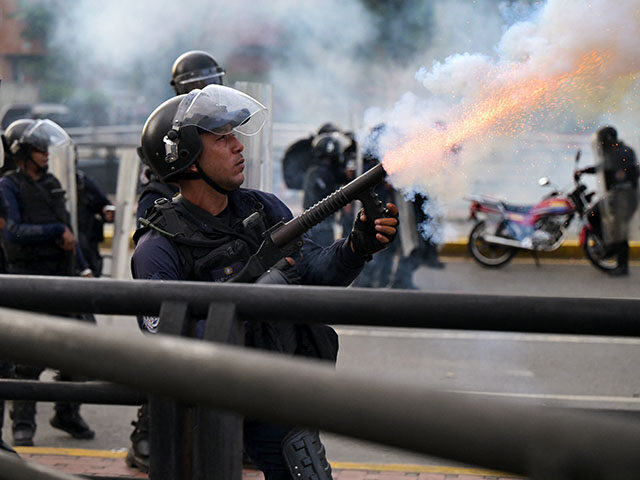The United Nations Independent International Fact-Finding Mission on the Bolivarian Republic of Venezuela (FFMV) accused the socialist regime on Tuesday of committing crimes against humanity during the violent crackdown following the fraudulent July presidential election.
The Fact-Finding Mission was established in 2019 to investigate allegations of human rights violations committed by the regime of dictator Nicolás Maduro. The United Nations Human Rights Council voted in early October to extend the Mission’s mandate for an additional two-year period.
The Venezuelan socialist regime held a fraudulent presidential election on July 28 that Maduro and the Venezuelan authorities claim the dictator “won.” The international community has largely rejected Maduro’s claimed “victory,” particularly after the Venezuelan opposition published evidence that suggests Edmundo González, a 75-year-old diplomat that fled to Spain in September, defeated Maduro in a landslide.
In its latest 161-page report on Venezuela, the Fact-Finding Mission documented human rights violations in Venezuela following the fraudulent July election that the Mission confirmed qualify as “crimes against humanity.”
The report detailed several cases of killings, forced disappearances, sexual assault, gender-based violence, and physical, psychological and sexual torture committed by Venezuelan security forces, government officials, and the colectivos, armed socialist gangs that serve Maduro.
The Mission stated on Tuesday that the human rights violations are taking place as part of a “coordinated plan to silence critics and perceived opponents” of the socialist regime, stressing that children and people with disabilities are among the victims.
“The Mission reported that detainees are threatened, including with acts of torture, in order to incriminate themselves for serious crimes, such as terrorism,” the statement read. “The lack of evidence and the absence of lawyers of their choice place victims in a position of special vulnerability as self-incrimination could bring disproportionately high prison penalties.”
“Particularly serious is the situation of detained children and adolescents, who face the same threats and are not receiving the special protection measures required by international law,” it continued.
Venezuelans protested the dictator’s claimed “victory,” to which Maduro responded with a brutal persecution campaign that left 27 dead and more than 2,400 detained according to U.N. estimates. The socialist regime also hunted protesters with smartphone applications. Some of the dissidents and politicians arrested were forced to record humiliating “terror” videos as part of “Operation Knock Knock.”
In August, Maduro commissioned the construction of two “reeducation camps” for dissidents housed in prisons that the regime emptied of its inmates last year. Many of the detainees, including minors, presently face charges of “terrorism” for protesting against the regime.
One of the cases investigated by the Mission, the report read, was the case of two children who were subject to beatings by the arresting officials, resulting in one of the children suffering broken teeth and an arm injury. Another child was threatened with death to coerce him into confessing on videotape that he received money to participate in a protest.
The Mission also recounted the testimonies of two two girls aged 16 and 17 years old who were
detained by the Bolivarian National Guard while walking down the street near a demonstration. The girls were handed over to Bolivarian National Police officials, who subjected them to threats, groping and food deprivation in an intimidating context.
Other acts of sexual and gender-based violence investigated by the Mission included:
threat of rape and sexual violence; sexual violence including groping of breasts, buttocks and genitals; forced nudity in front of custodians and other detainees of the opposite sex, sometimes with the obligation to perform physical exercises; invasive body searches of detainees or visitors; sexual exploitation and coercive transactional sex; sexist insults; denial of sexual and reproductive rights.
The Mission’s report documented that 25 of the deaths — the majority of the deaths recorded in other U.N. reports — took place between July 28-30, of which two were children aged 15 and 17 years old. Of those, 24 people, including the two children, died of firearm wounds and one from a beating. Most of the victims were found to be men under 30 years of age. The Mission stated that almost all of the victims resided in low-income neighborhoods, some of whom were laborers, motorcycle taxi drivers, barbers, and small shopkeepers.
The Fact-Finding Mission pointed out in its report that Venezuelan Attorney General Tarek William Saab claimed that none of the deaths were attributable to state actors “because we have not received a single complaint” was filed against them. The U.N. was not able to determine the type of ammunition fired at the 24 persons killed by firearms, as it was not recorded in the death certificates and death records.
“The Mission’s report confirms the conclusion that some of the serious human rights violations investigated during this period were committed following the same course of conduct previously qualified by the mission as crimes against humanity,” the press release stated. “Furthermore, such violations, committed with discriminatory intent, amounts to the crime against humanity of persecution on political grounds based on the identity of the victims.”
The Mission asserted that it will continue with the investigations already started on the situation of human rights before, during, and after the July 2024 election, “and on the violence by armed individuals known as ‘colectivos,’ as requested by the Human Rights Council.”
The aftermath of the fraudulent election, and the Maduro regime’s brutal crackdown, has prompted a surge in Venezuelan migrants fleeing from their country, some of whom have crossed through the Darién Gap jungle trail between Colombia and Panama, while others have fled to neighboring nations such as Brazil.
A poll published by the Venezuelan firm Meganálisis in mid-August found that 40 percent of Venezuelans — more than 10 million people — are considering leaving their country following the July election.
Christian K. Caruzo is a Venezuelan writer and documents life under socialism. You can follow him on Twitter here.

COMMENTS
Please let us know if you're having issues with commenting.